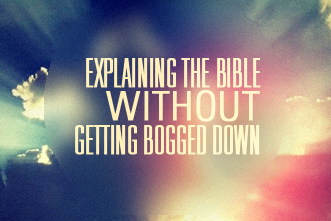Lately I’ve been pondering the issue of explaining the biblical text. This is one of the staple ingredients in all true biblical preaching. I wouldn’t like to taste omelette made without eggs, or preaching without explanation. But doesn’t explanation get a bit dull? It certainly can. Read a verse, say what it means, read a verse, say what it means. This can be dullness personified in a pulpit. But it doesn’t have to be dull. Actually, it has to not be dull, otherwise we’re boring people with the Bible.
Here are fifteen brief suggestions on ways to explain a biblical text.
1. Don’t think that the context isn’t critical.
It really is. Neither short-change the historical situation and setting so that the text feels like a random set of statements, nor overkill the historical background so that the listeners feel like they need to lie down before they’ve even met the text you’re preaching.
2. Do set the scene with the written context.
Even if it is only a few sentences, help orient listeners to what has come before, or how this text fits into the whole passage. Remember that most books/letters were written to be heard as a whole.
3. Don’t forget that length of explanation may influence order of content.
In a single sentence, the order of thought may work in a way that it won’t when developed into a sermon. The same is true of some Bible texts. For instance, here’s a random sentence: “I am going to town, to go to the electrical store, to replace our dead washing machine.” That makes sense, but what happens if I “sermonize” it? “I am going to town: not to the country, nor to a suburb, but to town. Specifically, the town of . . . “ Suddenly it feels a bit random and aimless.
4. Do weigh words appropriately.
Or to put it the other way around: don’t treat every word as equal. It can be dull beyond words to hear an explanation of word after word in a text. Take, for example, Ephesians 1:15ff. It would be easy to explain great words like faith, Christ, love, saints, glory, etc., but lose people before they get to the main thought of the sentence – the end of verse 17 onwards. Put energy into the main words, not equal energy into all words. They all matter, but some are pushing you toward others.
5. Don’t treat a verse as a unit of thought.
This is the same as above. It is tempting to go verse by verse, but sometimes a verse is half a sentence. Don’t feel bad about summarizing chunks effectively in order to emphasise the main thoughts in a section of text.












